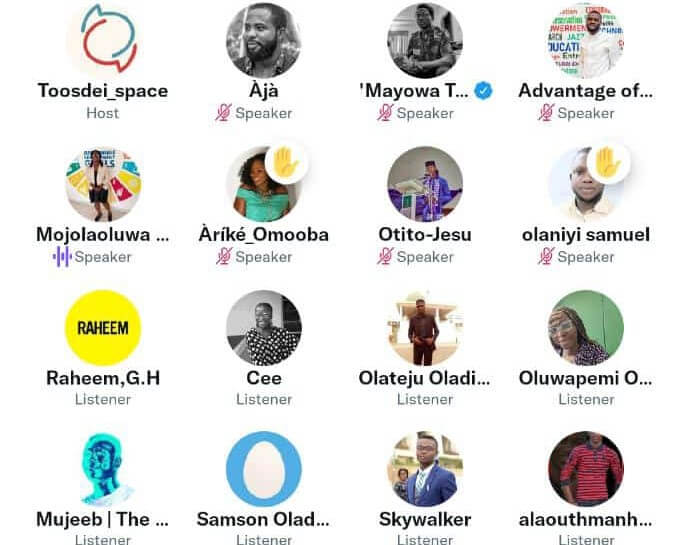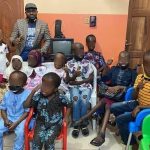Inside his office daily, when Oredola Ibrahim is not training youths in digital skills, he is answering business calls, sending and replying to emails, or meeting clients who consult a social enterprise he co-founded for their digital services.
Amid the rising cost of goods and diminishing purchasing power in Nigeria, he must work hard to make just enough for his livelihood. And when he returns home late in the evening after navigating through late-hour rush traffic around Ajibode town in Oyo State, where he lives and works, he is burned out.
“After workday, you are tired; you have a lot of things to rant about in Nigeria [because] a lot of things are not working,” he said, adding that it sometimes affects his mental health.
He is not alone.
There has been an alarming rise in mental health issues among Nigerians due to worsening economic and security conditions, especially among youths.
By 2016, a World Health Organisation report said Nigeria had the highest suicide rate in Africa and the sixth highest globally. And at the onset of COVID-19, UNICEF said one in six Nigerian youths dealt with mental health issues.
Ranting for relief
After a tiring day one Tuesday in December 2020, Ibrahim wanted to check on his close contacts to know how they coped with that day’s challenges. So he took to his Whatsapp status and typed, “It’s Toosdei; how was your day today?”
Some friends who viewed his status replied with direct messages, some ranting about the day’s stress, others complaining about the worsening traffic, economic and security situations, and others seeking advice on coping.
Ibraham then posted back those replies and requests for advice on his status, hiding the person’s identity. Those who viewed the reactions sent him their advice privately, which he sent to those seeking advice and screenshot and posted on his status for others going through similar challenges to view and find support. It was a sort of blind conversation where Ibrahim was between them.
Given the responses showing his contacts’ interest in venting their feelings and anger to find relief, Ibrahim posted another query on his status the following Tuesday and got even more responses.
From then on, he repeated the process every Tuesday night, starting every post with “It’s Toosdei…” and referring to those who responded to his queries or supported others as “Toosderians”, a name they happily answer. Toosdei is the pidgin English version of Tuesday, and Toosderians is because he posted only on Tuesdays.
As these rants continued on his status for about a year, in December 2021, Ibrahim organised the first Toosdei physical hangout at Race Course Adamasingba, a restaurant in Ibadan, Oyo State, in southwest Nigeria, for his immediate contacts.
About 55 Toosderians who had followed the Toosdei posts and shared rants met and had discussions and networking sessions. It marked the formal creation of the Toosdei Space in early 2022 alongside his friend, Omegih Damil, as a safe space for young people to express themselves freely without being judged, network and get support.
“The whole idea was born out of (efforts towards) trying to give young people a platform to express themselves, to vent out their anger, and get support from,” said the social entrepreneur.
There is the Toosdei Discord channel serving as the base of the community. About 100 users share rants there and interact anonymously.
The anonymous WhatsApp Status posting is still retained. There is a weekly conversation on Twitter Spaces every Tuesday evening where participants discuss topics like friendship, relationships, heartbreak, office politics, horrible bosses, mental health, self-love, social pressure and other issues.
Abdulmuiz Oyekola, who follows the discussion weekly on Twitter, said the spaces encourage “and give [me] that sense of peace that the world is not against someone in whatsoever one is facing because you will [during discussions] see different stories from people’s rant to prove that.”
Members also help each other to meet their material needs. For example, one student was supported to get a laptop to aid his studies. Others receive short-term loans, help with accommodation, scholarship and jobs opportunities-related information.
Tuesday is a day I look up to amongst the days in the week.
Connecting and listening to fellow Toosderians gives me unquantifiable joy.You can be part of this family, join us @Toosdei_space by 9pm pic.twitter.com/Gq33T3GALY
— OLA OMO IBADAN (@Olaolu_olaniyi) October 4, 2022
One Tuesday in August 2022, a 30-week pregnant Toosderian shared an anonymous rant on how financial hardship and debt were giving her sleepless nights. She explained that her husband, a Nigerian university lecturer, had been at home for months without pay due to the strike by the Academic Staff Union of Universities or ASUU, and her parents were no longer able to support her. She was already heavily in debt and needed money to buy things preparatory for delivery.
Before the end of the day, one Toosderian gave her N10,000 (about $23), another offered to pay her the same amount monthly till ASUU called off the strike, and more Toosderians gave her more assistance in the days following.
Ranting is healthy
Adebayo Adebisi, a consultant psychiatrist at the Federal Neuropsychiatry Hospital in Sokoto, confirmed that a community like Toosdei Space could prevent mental health issues, breakdowns, and the urge to succumb to life challenges. He said those who have not been in certain situations learn coping strategies, and those currently facing them feel encouraged and find reasons to overcome them.
Meanwhile, since the first physical hangout in late 2021, the community has engaged mostly virtually as it keeps gaining members who engage anonymously. While the virtual meetings may not offer very close intimacy like a physical therapy session, said Adebisi, it covers up with its ability to eliminate distance, bringing more diverse kinds of people to the gathering.
Last July, the community launched a Graduate School Application where members studying abroad mentor and guide others in applying for scholarships and admission into overseas schools.
But hosting the Twitter Space every Tuesday amid his busy personal and business schedules, poor network internet connectivity and other factors militating against virtual engagements in Nigeria has been a challenge for Ibrahim. In August, he changed the schedule for Twitter Spaces from weekly to twice monthly.
“It can be a lot to actually manage [the community] because I am trying to run my business, my personal life, and I am trying to run this (Toosdei community) that is not giving me any money,” he complained.
To relieve the stress, Ibrahim got eight volunteers who now help with planning programs, managing social media, and designing content.
And he intends to start holding physical hangouts so Toosderians can know themselves and expand the support group program to cover entrepreneurship and professional development.
This story was produced with the support of Nigeria Health Watch through the Solutions Journalism Network, a nonprofit organisation dedicated to rigorous and compelling reporting about responses to social problems.
Oredola Ibrahim, a social entrepreneur in Nigeria, balances his work in training youths in digital skills and managing digital services with the daily struggles of traffic and economic hardship. His exhaustion at the end of each day drives him to an initiative called Toosdei, where every Tuesday, he engages his WhatsApp contacts to share and cope with their challenges anonymously. This turned into a supportive community called Toosdei Space, where members share their frustrations and find solidarity and advice from others.
The community, which also operates on a Discord channel and Twitter Spaces, provides a space for discussions on various personal issues and supports each other materially. Mental health professionals affirm the positive impacts of such a community on preventing mental health issues.
Despite challenges in managing the community alongside his personal and professional life, Ibrahim continues to foster Toosdei Space with the help of volunteers and plans to expand its support to entrepreneurship and professional development.
This story highlights the significance of providing platforms for young Nigerians to express and navigate their challenges amidst an environment of economic and social stress.






